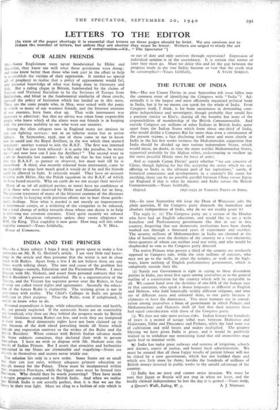THE FUTURE OF INDIA
Snt,—Has not Canon Davies in your September 6th issue fallen into the common error of identifying the Congress with " India "? Ad- mittedly it is the largest and most efficiently organised political body in India, but it by no means can speak for the whole of India. Even Congress itself, I think, is far from unanimous in demanding com- plete independence and sovereignty, though probably they would like a position similar to Eire's, sharing all the benefits but none of the responsibilities of membership of the British Commonwealth. And outside Congress are millions of other Indians in British India, quite apart from the Indian States which form about one-third of India, who would dislike a Congress Raj far more than even a continuance of the present regime, a fact disclosing itself more and more clearly in India in the last few weeks (witness the Muhammedan suggestion that India should be divided up into various independent States, which would mean, no doubt, in time the more warlike Muhammedan States, supported probably by the Afghan tribes, endeavouring to swallow up the more peaceful Hindu ones by force of arms).
And as regards Canon Davies' query whether " we can conceive of China, though fighting for her life, accepting the status which we arc offering to India as the ultimate goal of her aspirations," surely, if historical connexions and developments in a country's life count for anything, there can be no possible parallel between China versus Japan (or England if that is what he means) and India versus the British Commonwealth.—Yours faithfully,


























 Previous page
Previous page